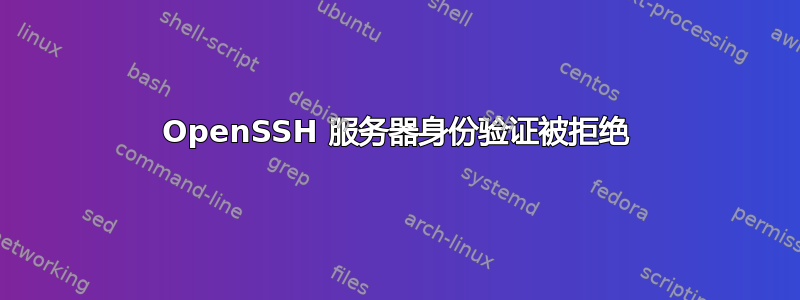
我在 PXA270 平台 (armv5tel) 上运行 Linux 版本 2.6.27-vpac2。我有一个 OpenSSH 版本 3.8.1 p1 (Debian-8.sarge.4),想让它运行。我已运行 -ddd 格式的 sshd 进行调试,下面是我尝试连接时的结果:
root@thisslave:~/.ssh$ /usr/sbin/sshd -ddd -f /etc/ssh/sshd_config
debug2: read_server_config: filename /etc/ssh/sshd_config
debug1: sshd version OpenSSH_3.8.1p1 Debian-8.sarge.4
debug1: private host key: #0 type 0 RSA1
debug3: Not a RSA1 key file /etc/ssh/ssh_host_rsa_key.
debug1: read PEM private key done: type RSA
debug1: private host key: #1 type 1 RSA
debug3: Not a RSA1 key file /etc/ssh/ssh_host_dsa_key.
debug1: read PEM private key done: type DSA
debug1: private host key: #2 type 2 DSA
debug1: Bind to port 22 on 0.0.0.0.
Server listening on 0.0.0.0 port 22.
socket: Address family not supported by protocol
debug1: Server will not fork when running in debugging mode.
Connection from 192.168.1.101 port 40520
debug1: Client protocol version 2.0; client software version OpenSSH_5.8p1 Debian-7ubuntu1
debug1: match: OpenSSH_5.8p1 Debian-7ubuntu1 pat OpenSSH*
debug1: Enabling compatibility mode for protocol 2.0
debug1: Local version string SSH-2.0-OpenSSH_3.8.1p1 Debian-8.sarge.4
debug1: list_hostkey_types: ssh-rsa,ssh-dss
debug1: SSH2_MSG_KEXINIT sent
debug1: SSH2_MSG_KEXINIT received
debug2: kex_parse_kexinit: diffie-hellman-group-exchange-sha1,diffie-hellman-group1-sha1
debug2: kex_parse_kexinit: ssh-rsa,ssh-dss
debug2: kex_parse_kexinit: aes128-cbc,3des-cbc,blowfish-cbc,cast128-cbc,arcfour,aes192-cbc,aes256-cbc,[email protected],aes128-ctr,aes192-ctr,aes256-ctr
debug2: kex_parse_kexinit: aes128-cbc,3des-cbc,blowfish-cbc,cast128-cbc,arcfour,aes192-cbc,aes256-cbc,[email protected],aes128-ctr,aes192-ctr,aes256-ctr
debug2: kex_parse_kexinit: hmac-md5,hmac-sha1,hmac-ripemd160,[email protected],hmac-sha1-96,hmac-md5-96
debug2: kex_parse_kexinit: hmac-md5,hmac-sha1,hmac-ripemd160,[email protected],hmac-sha1-96,hmac-md5-96
debug2: kex_parse_kexinit: none,zlib
debug2: kex_parse_kexinit: none,zlib
debug2: kex_parse_kexinit:
debug2: kex_parse_kexinit:
debug2: kex_parse_kexinit: first_kex_follows 0
debug2: kex_parse_kexinit: reserved 0
debug2: kex_parse_kexinit: ecdh-sha2-nistp256,ecdh-sha2-nistp384,ecdh-sha2-nistp521,diffie-hellman-group-exchange-sha256,diffie-hellman-group-exchange-sha1,diffie-hellman-group14-sha1,diffie-hellman-group1-sha1
debug2: kex_parse_kexinit: [email protected],[email protected],ssh-rsa,[email protected],[email protected],[email protected],[email protected],[email protected],ecdsa-sha2-nistp256,ecdsa-sha2-nistp384,ecdsa-sha2-nistp521,ssh-dss
debug2: kex_parse_kexinit: aes128-ctr,aes192-ctr,aes256-ctr,arcfour256,arcfour128,aes128-cbc,3des-cbc,blowfish-cbc,cast128-cbc,aes192-cbc,aes256-cbc,arcfour,[email protected]
debug2: kex_parse_kexinit: aes128-ctr,aes192-ctr,aes256-ctr,arcfour256,arcfour128,aes128-cbc,3des-cbc,blowfish-cbc,cast128-cbc,aes192-cbc,aes256-cbc,arcfour,[email protected]
debug2: kex_parse_kexinit: hmac-md5,hmac-sha1,[email protected],hmac-ripemd160,[email protected],hmac-sha1-96,hmac-md5-96
debug2: kex_parse_kexinit: hmac-md5,hmac-sha1,[email protected],hmac-ripemd160,[email protected],hmac-sha1-96,hmac-md5-96
debug2: kex_parse_kexinit: none,[email protected],zlib
debug2: kex_parse_kexinit: none,[email protected],zlib
debug2: kex_parse_kexinit:
debug2: kex_parse_kexinit:
debug2: kex_parse_kexinit: first_kex_follows 0
debug2: kex_parse_kexinit: reserved 0
debug2: mac_init: found hmac-md5
debug1: kex: client->server aes128-ctr hmac-md5 none
debug2: mac_init: found hmac-md5
debug1: kex: server->client aes128-ctr hmac-md5 none
debug1: SSH2_MSG_KEX_DH_GEX_REQUEST received
debug1: SSH2_MSG_KEX_DH_GEX_GROUP sent
debug2: dh_gen_key: priv key bits set: 134/256
debug2: bits set: 518/1024
debug1: expecting SSH2_MSG_KEX_DH_GEX_INIT
debug2: bits set: 538/1024
debug1: SSH2_MSG_KEX_DH_GEX_REPLY sent
debug2: kex_derive_keys
debug2: set_newkeys: mode 1
debug1: SSH2_MSG_NEWKEYS sent
debug1: expecting SSH2_MSG_NEWKEYS
debug2: set_newkeys: mode 0
debug1: SSH2_MSG_NEWKEYS received
debug1: KEX done
debug1: userauth-request for user root service ssh-connection method none
debug1: attempt 0 failures 0
debug2: input_userauth_request: setting up authctxt for root
debug2: input_userauth_request: try method none
Failed none for root from 192.168.1.101 port 40520 ssh2
debug1: userauth-request for user root service ssh-connection method publickey
debug1: attempt 1 failures 1
debug2: input_userauth_request: try method publickey
debug1: test whether pkalg/pkblob are acceptable
debug1: temporarily_use_uid: 0/0 (e=0/0)
debug1: trying public key file /root/.ssh/authorized_keys
debug3: secure_filename: checking '/root/.ssh'
debug3: secure_filename: checking '/root'
Authentication refused: bad ownership or modes for directory /root
debug1: restore_uid: 0/0
debug1: temporarily_use_uid: 0/0 (e=0/0)
debug1: trying public key file /root/.ssh/authorized_keys
debug3: secure_filename: checking '/root/.ssh'
debug3: secure_filename: checking '/root'
Authentication refused: bad ownership or modes for directory /root
debug1: restore_uid: 0/0
debug2: userauth_pubkey: authenticated 0 pkalg ssh-rsa
Failed publickey for root from 192.168.1.101 port 40520 ssh2
debug1: userauth-request for user root service ssh-connection method keyboard-interactive
debug1: attempt 2 failures 2
debug2: input_userauth_request: try method keyboard-interactive
debug1: keyboard-interactive devs
debug1: auth2_challenge: user=root devs=
debug1: kbdint_alloc: devices 'pam'
debug2: auth2_challenge_start: devices pam
debug2: kbdint_next_device: devices <empty>
debug1: auth2_challenge_start: trying authentication method 'pam'
debug3: PAM: sshpam_init_ctx entering
Failed keyboard-interactive for root from 192.168.1.101 port 40520 ssh2
Connection closed by 192.168.1.101
debug1: do_cleanup
需要注意以下几点:
1) 我正在使用当前在其他两台服务器(同一平台和 Linux 内核版本)中使用的密钥
2) 我已经为 .ssh 目录 (700)、authorized_keys (644) 设置了相应的权限。对于服务器,我认为这些是所需的,如果我错了,请纠正我。
3) 如果我关闭 StrictMode 设置(即设置为“否”)。我能够连接。但我认为我不应该这样做,因为正在运行的其他两个 sshd 服务器没有将该设置设置为“否”。
我真的很困惑,大约一个星期以来一直在尝试解决许可问题。希望有人能为我提供一些想法。
答案1
那么调试日志中显示两次的消息怎么办?
身份验证被拒绝:目录 /root 的所有权或模式错误
修复权限/root并查看会将您带到何处。
答案2
我刚刚遇到了完全相同的情况:(bad ownership on /xxx顶部文件夹)。
就我而言,所有其他常见的 ssh 要求均已满足:
- 没有“
w”表示可以去任何地方(团体或其他) - 700 为
.ssh - 600 为
.ssh/authorized_keys
然而,一个sshd -d会议一直显示
Authentication refused: bad ownership or modes for directory /xxx
我发现的唯一差异是/xxx/yyy由 拥有root,而/xxx由“ ”拥有aUser。
我做root了chown root:root /xxx
错误就消失了。
答案3
问题已打印在您的日志中:
Authentication refused: bad ownership or modes for directory /root
检查 root 用户主目录的权限/root。
来自实时服务器的工作权限示例:
error@www ~ $ ls -ld /root
drwx------. 6 root root 4096 Oct 16 19:12 /root
答案4
这篇博客文章提供了更全面的答案: http://www.daveperrett.com/articles/2010/09/14/ssh-authentication-refused/
它的 TL;DR 版本是(权限相当具体):
chmod go-w /home/your-user
chmod 700 /home/your-user/.ssh
chmod 600 /home/your-user/.ssh/authorized_keys*
此外,如果您的用户主目录是一个符号链接,您也需要跟随它并将 chmod go-w / chmod 755 也指向该目录。


